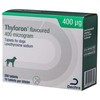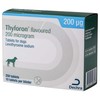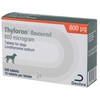Thyforon
Thyforon Flavoured Tablets are for the treatment of hypothyroidism in dogs. They have been given a natural meat flavour for palatability and contain Levothyroxine Sodium, which is a synthetic thyroid hormone replacement.
Thyforon Tablets are off-white round tablets with brown spots. They have been scored on both sides so that they can be divided into equal halves or quarters.
Thyforon 400mcg Flavoured Tablets for Dogs
£0.17Thyforon Flavoured Tablets are indicated for the treatment of hypothyroidism in dogs. Thyforon contains a synthetic thyroid hormone replacement, and has a natural meat flavour to encourage...[More info]
Thyforon 200mcg Flavoured Tablets for Dogs
£0.16Thyforon Flavoured Tablets are indicated for the treatment of hypothyroidism in dogs. Thyforon contains a synthetic thyroid hormone replacement, and has a natural meat flavour to encourage...[More info]
Thyforon 800mcg Flavoured Tablets for Dogs
£0.36Thyforon Flavoured Tablets are indicated for the treatment of hypothyroidism in dogs. Thyforon contains a synthetic thyroid hormone replacement, and has a natural meat flavour to encourage...[More info]
Contraindications
Do not use in dogs suffering from uncorrected adrenal insufficiency.
Do not use in cases of known hypersensitivity to levothyroxine sodium or to any of the excipients.
Special warnings for each target species
The diagnosis of hypothyroidism should be confirmed with appropriate tests.
Special precautions for use in animals
The tablets are flavoured. In order to avoid any accidental ingestion, store tablets out of reach of animals. A sudden increase in demand for oxygen delivery to peripheral tissues, plus the chronotropic effects of levothyroxine sodium, may place undue stress on a poorly functioning heart, causing decompensation and signs of congestive heart failure.
Hypothyroid dogs suffering from hypoadrenocorticism have a decreased ability to metabolise levothyroxine sodium and therefore an increased risk of thyrotoxicosis. Dogs with concurrent hypoadrenocorticism and hypothyroidism should be stabilised with glucocorticoid and mineralocorticoid treatment prior to treatment with levothyroxine sodium to avoid precipitating a hypoadrenocortical crisis. After this, thyroid tests should be repeated, then gradual introduction of levothyroxine therapy, starting with 25% of the normal dose, increasing by 25% increments every fortnight until optimal stabilisation is achieved, is recommended. Gradual introduction of therapy is also recommended for dogs with other concurrent illnesses; particularly in dogs with cardiac disease, diabetes mellitus and renal or hepatic dysfunction.
Special precautions to be taken by the person administering the veterinary medicinal product to animals
Wash hands after administering the tablets. Pregnant women should handle the product with caution. In the case of accidental ingestion, seek medical advice immediately and show the package leaflet or the label to the physician. To the physician: this product contains a high concentration of L-thyroxine sodium and may present a risk to humans, in particular children, if ingested.
Adverse reactions
Restoration of physical activity may unmask or intensify other problems, such as osteoarthrosis.
Adverse reactions of thyroid hormones are generally associated with excessive dosage and correspond to the symptoms of hyperthyroidism.
See also Overdose.
Use during pregnancy and lactation
The safety of the veterinary medicinal product has not been established in pregnant or lactating bitches. However, levothyroxine is an endogenous substance and thyroid hormones are essential for the developing foetus, especially during the first period of gestation. Hypothyroidism during pregnancy may result in major complications such as foetal death and a poor perinatal outcome. Maintenance dose of levothyroxine sodium may need adjustment during pregnancy. Pregnant bitches should therefore be monitored on a regular basis from conception until several weeks after delivery.
Interactions
A variety of drugs may impair plasma or tissue binding of the thyroid hormones or alter thyroid hormone metabolism (e.g. barbiturates, antacids, anabolic steroids, diazepam, furosemide, mitotane, phenylbutazone, phenytoin, propranolol, large doses of salicylates and sulphonamides). When treating dogs that are receiving concurrent medication the properties of these drugs should be taken into consideration.
Oestrogens may increase thyroid requirements.
Ketamine may cause tachycardia and hypertension when used in patients receiving thyroid hormones.
The effect of catecholamines and sympathomimetics is increased by levothyroxine.
An increase in the dosage of digitalis may be necessary in a patient that had previously compensated congestive heart failure and that is placed on thyroid hormone supplementation. Following treatment of hypothyroidism in dogs with concurrent diabetes, careful monitoring of diabetic control is recommended.
Most dogs on chronic high dose, daily glucocorticoid therapy will have very low or undetectable serum T4 concentrations, as well as subnormal T3 values.
Amounts to be administered and administration route
For oral administration. The recommended starting dosage of levothyroxine sodium is 10 µg/kg body weight orally every 12 hours. Because of variability in absorption and metabolism, the dosage may require alterations before a complete clinical response is observed. The initial dosage and frequency of administration are merely a starting point. Therapy has to be highly individualised and tailored to the requirements of the individual dog. When initiating dosing of dogs weighing less than 5 kg body weight, a quarter of one 200 μg tablet should be administered once daily. Such cases should be monitored carefully. In the dog, absorption of levothyroxine sodium may be affected by the presence of food. The timing of treatment and its relation to feeding should therefore be kept consistent from day to day. To adequately monitor therapy, trough values (just prior to treatment) and peak values (about three hours after dosing) of plasma T4 can be measured. In adequately dosed dogs peak plasma concentration of T4 should be in the high-normal range (approximately 30 to 47 nmol/l) and trough values should be above approximately 19 nmol/l. If T4 levels are outside this range the levothyroxine dose can be adjusted in 50 to 200 µg increments until the patient is clinically euthyroid and serum T4 is within the reference range. Plasma T4 levels can be retested two weeks after change of dosage, but clinical improvement is an equally important factor in determining individual dosage and this will take four to eight weeks. When the optimum replacement dose has been attained, clinical and biochemical monitoring may be performed every 6-12 months.
To break a tablet accurately and easily, place the tablet score side up and apply pressure with your thumb.
To break the tablet in two parts; hold one half of the tablet down and press down the other half.
Overdose
Following administration of overdoses thyrotoxicosis could occur. Thyrotoxicosis as a side effect of mild over-supplementation is uncommon in dogs, owing to the canine ability to catabolize and excrete thyroid hormones. In case of accidental intake of large amounts of the veterinary medicinal product absorption can be decreased by induction of vomiting and oral administration of both activated charcoal and magnesium sulphate once.
Overdoses of three up to six times label recommended starting dose for 4 consecutive weeks in healthy, euthyroid dogs resulted in no significant clinical signs that could be attributed to treatment. Single overdose up to 3-6x the recommended dose does not pose a threat to the dog, and no actions are necessary. However, following chronic over-supplementation, clinical signs of hyperthyroidism such as polydipsia, polyuria, panting, weight loss without anorexia, and either or both tachycardia and nervousness may theoretically occur. The presence of these signs should result in evaluation of T4 serum concentrations to confirm the diagnosis, and immediate discontinuance of the supplementation. Once the signs have abated (days to weeks), the thyroid dosage has been reviewed, and the animal has fully recovered, a lower dosage may be instituted, with the animal being monitored closely.


